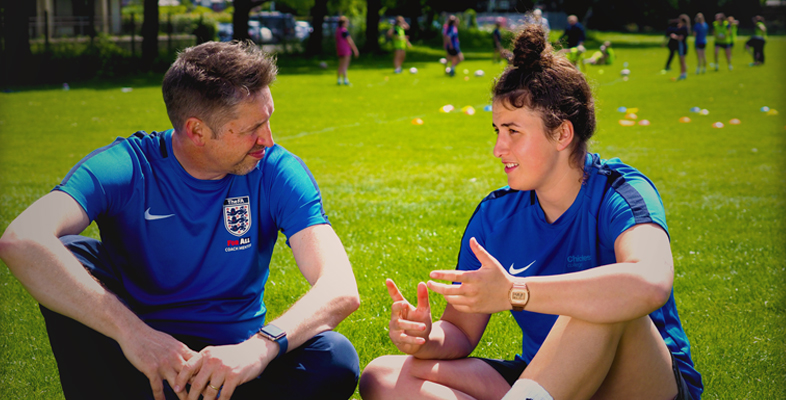2 Power and coach developers
In the following activity you will read an article that has been specially written for this course by Ed Cope, Learning design and development manager at the Football Association.
The article offers a rich insight into the type of power that exists between coaches and coach developers. The article also illustrates how coach developers can become more self-aware of the power they possess and in so doing use their power to better support learning and development.
Activity 2 Power: Why it should be shared with rather than exerted on coaches
Read the following article (5 minute read time) by Ed Cope, Learning design and development manager at the Football Association. As you read the article respond to these three questions:
- Why is context vital to fully understanding the distribution of power between a coach and coach developer?
- Traditionally, how does the hierarchical structure of the coach–coach developer relationship influence power?
- How can coach developers share power with coaches?
Understanding power in the learning and development process: Insights for coach developers
As a coach developer, you hold a position of power over coaches. Power is the notion of being able to influence the behaviours of others, and materializes in many different ways, including economic, cultural and social. In the context of the coach–coach developer relationship, it is social power that is most applicable. Social power refers to how people use their social position to influence the behaviours of others within a particular context. Context is a vital factor here, as this determines who holds the power and the extent to which they hold it. For example, while a coach developer may have power over a grassroots coach because of the relationship they hold, the same coach developer will hold a different relationship with a coach working in a different context and therefore the power relationship will be different.
Status and esteem – a source of power
Traditionally, the role of a coach developer has been hierarchically positioned above that of a coach. This situation has emerged often because coach developers have transitioned into this role from being experienced coaches who often hold the highest-level coaching qualification and coaching positions relevant to the context they are working in. Because of coach developers’ biographies and the esteem they tend to possess, their ideas and practices go unquestioned by coaches who simply conform through fear of being embarrassed or ostracized if they do not. This is especially the case on formal coaching qualification courses, where coach developers are responsible for making judgements of coach competency.
Historically, it has been common for coach developers to see themselves as the ‘knowledge bearer’ whose role is to pass knowledge down to coaches. The term ‘empty vessels waiting to be filled’ is a term that has been coined by coaching scholars (Cushion et al., 2003) to indicate how coaches are passive recipients of the education they receive. The more coaches are exposed to this approach the more they uncritically accept ideas presented to them. Over time, coaches transitioning into coach developer roles end up promoting the very approach that they were subjected to, and thus the process becomes cyclical and reproduced successively over periods of time. This is particularly problematic as their coach development practice will unlikely ever be as effective as it has the potential to be in terms of positively impacting coach learning and development.
Sharing power with coaches
Clearly a learning culture that does not promote the questioning of ideas and practices, and crucially where these come from, is not conducive for an honest, trusting and effective coach–coach developer relationship. To move this forward, coach developers need to recognize the power they have and adopt strategies that lead to this power being shared with, rather than exerted on, coaches. Such strategies include listening to coaches to understand their learning needs, avoiding making judgements on coaches’ practice before understanding the context in which they work and who it is they work with, and being open-minded to consider alternative ways of responding to problems faced that may not fit with existing experiences.
Discussion
- As you saw in the first activity of Session 1, the relationship between a coach and a coach developer varies according to the context of the relationship. This can mean the power relationship between a highly experienced coach developer and a novice beginner coach will be very different to the degree of power the same coach developer will have over a highly experienced and well qualified coach.
- Coach developers tend to be experienced and highly qualified coaches in their own right. Where this occurs it creates a hierarchical structure in which the distribution of power can be unequal and coaches feel relatively powerless to challenge or question the practice of the coach developer.
- Coach developers can become more aware of the power they have – this is the purpose of this session – and through this greater degree of self-awareness they can learn to share rather exert power on coaches. The article provides some practical suggestions on how this can be achieved and these are worth noting.
In the sections that follow you explore three examples (Cases A–C) that illustrate further the arguments made in the article. As you will discover, two of the examples represent power and influence being exerted on coaches rather than shared with coaches, while the third represents power being exerted on coach developers.
The examples highlight the complexity of power relations and the extent to which the presence, use and effect of power to influence others shifts and flows from context to context. Power is therefore never produced and reproduced identically across all coach–coach developer relationships.

